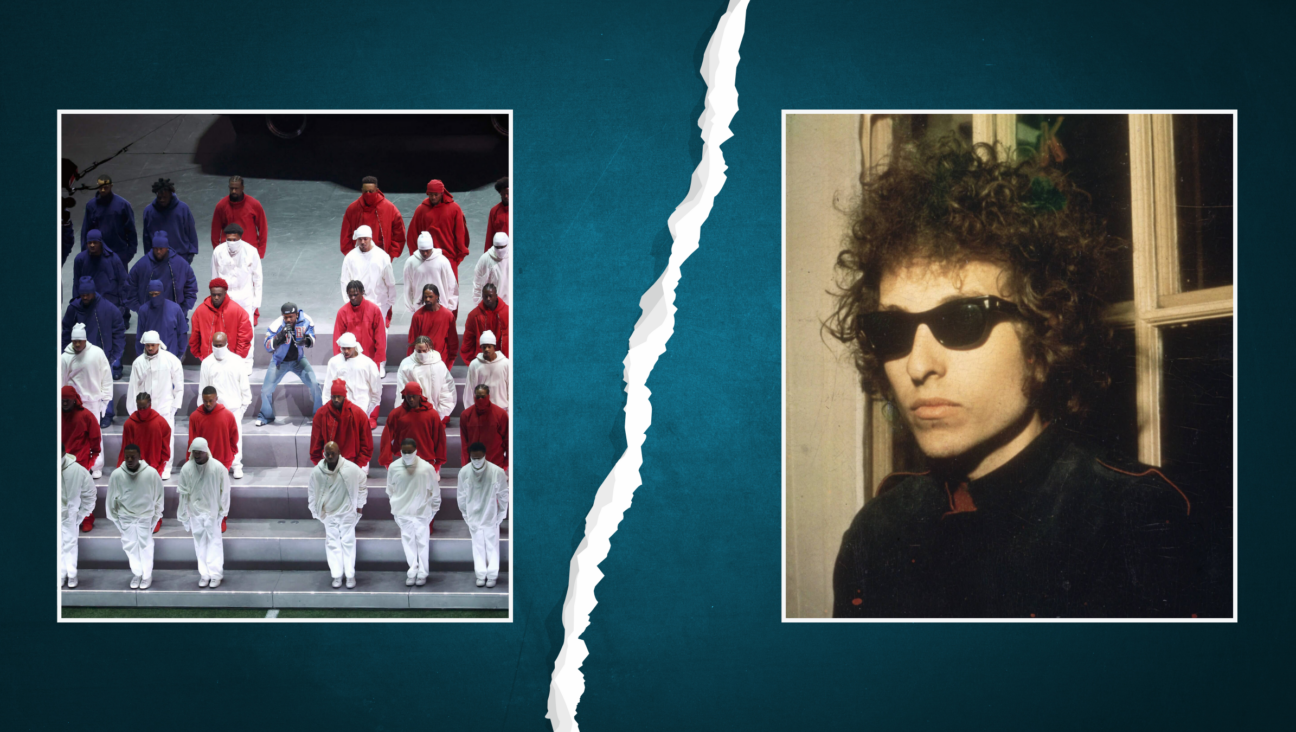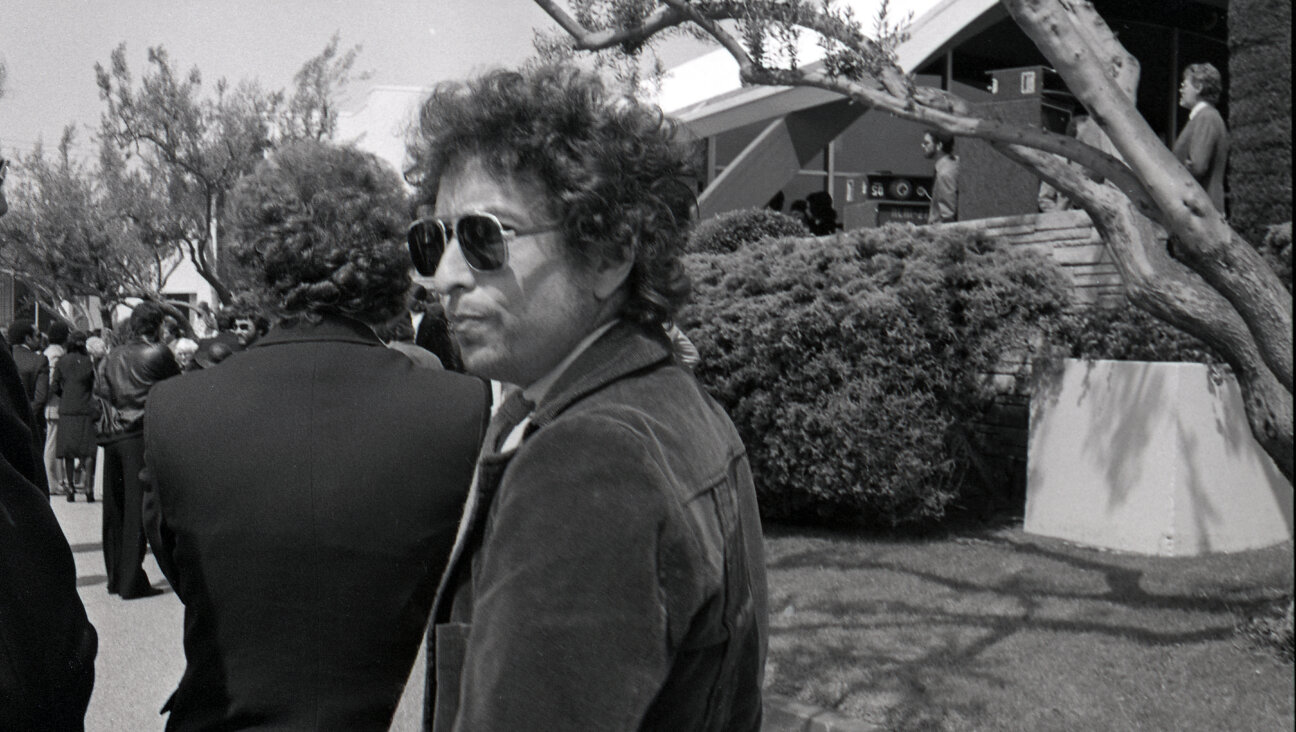Klezmer Revivalists Hail The Lords Of The ‘Tanz!’

Michael Winograd’s Tanz ensemble. Image by Seth Rogovoy
In 1955, just when klezmer was about to end its half-century-long run as a viable commercial and creative outlet for immigrant-era Jewish musicians and a few younger instrumentalists who took up their torch, the great Ukrainian-born clarinetist Dave Tarras recorded one more album at the urging and with the creative guidance of his son-in-law, Sam Musiker – himself a scion of an Old World klezmer dynasty. The resulting album, “Tanz!”, released by Columbia Records and credited to Dave Tarras and the Musiker Brothers — Sam’s brother Ray was also a musician – promptly tanked and spelled the last gasp of the chain of recorded klezmer that connected Tarras’s Eastern European stylings with American influences including marching band music, early jazz, theater music, and swing. Indeed, Sam Musiker was a charter member of the Gene Krupa Orchestra, and he knew his way around the jazz bandstand.
About 30 years later, a new generation of klezmer revivalists began circulating old copies of “Tanz!”, which had long since been deleted from Columbia’s catalog. (Their interest in the album eventually prompted a re-release by Sony/Legacy in the late 1990s). As it turned out, this gem of an album was downright prescient in ways that Sam and Dave could not ever have imagined. Musiker’s attempt to cobble together a fusion of Tarras’s “traditional” style and repertoire with mid-century, horn-heavy big-band arrangements, which at their best bore the imprint of some of Duke Ellington’s painterly approach, anticipated the work of the more innovative klezmer revivalists of the 1980s and ‘90s – bands like the Klezmatics and the New Orleans Klezmer Allstars — who themselves had one foot in the Old World and the other in contemporary sounds and styles, including jazz, rock, and world music.
It came as no surprise, therefore, that a younger generation of musicians, led by clarinetist and bandleader Michael Winograd – who actually studied early on with Ray Musiker at KlezKamp – would take up the cause of celebrating the legacy and brilliance of “Tanz!” by re-creating it in full, as they did at the Town and Village Synagogue in the East Village on Tuesday, December 25, as part of the weeklong Yiddish New York festival (the successor in many ways to KlezKamp). Winograd labored over the original recording for months, figuring out the instrumentation and parts by ear, and reassembled the repertoire for the stage in a startling program filled with power, vibrancy, and stunning musicianship by the assembled group.
Winograd’s little big band included second clarinetist Marine Goldwaser – one of the unique innovations of “Tanz!” was to feature two clarinetists, playing in different styles and sometimes doubling the lines – as well as pianist Marilyn Lerner, trumpeter Frank London of the Klezmatics, and original Klezmatics drummer David Licht. The band was rounded out by Ilya Shneyveys on accordion, Alec Spiegelman on saxophone and bass clarinet, and Zoe Guigeno on bass.
One of Sam Musiker’s experiments was to let Dave Tarras be Dave Tarras and to recontextualize his stately, traditional style by seating it inside the harmonic bed of a horn-heavy, rhythmically propulsive jazz ensemble. And this was exactly the sort of thing that Winograd’s arrangements did best, not the least because, still only in his mid-30s, Winograd himself has emerged as the leading clarinetist of his generation, one who has steeped himself in historical styles – especially the playing of Dave Tarras, whose sound he can remarkably evoke – as well as developing his own sound. At times listeners could have closed their eyes and they would have been hard put to tell the difference between the player they were hearing and Tarras himself, surrounded by the brash, bright horns and the jazzy drumming of David Licht. It was a testament to Winograd’s achievement that by the third song seemingly half of the audience was up on its feet and remained so for the rest of the program, line dancing through the aisles of the synagogue’s sanctuary, perhaps to the disappointment of some who came for a close listen to Winograd’s project, but equally on the mark as a measure of the music’s appeal and effectiveness.
Just a few years after Sam and Dave recorded “Tanz!,” Irving Fields, America’s preeminent lounge pianist, cashed in on the Latin music craze of the late 1950s – especially among a Jewish audience – and made a notorious album, “Bagels & Bongos,” that recast Yiddish and Hebrew favorites as Afro-Cuban dance tunes. Thus, “Hava Nagila” became “Havana Nagila,” and “Der Rebbe Elimelech” became “Miami Merengue.” (Fields, incidentally, didn’t stop with Jewish-Latin fusion; he put out a series of albums, including “Pizza and Bongos” featuring Italian music and “Champagne and Bongos” based on French music.)
Unlike Sam Musiker’s attempt to create an artistically valid fusion, Fields’s project was a one-trick novelty that grew tired after three songs. Which is undoubtedly why instead of re-creating “Bagels and Bongos” note-for-note, trumpeter and arranger Frank London took the additional step of combining the Latin-Yiddish combination with a third element – that of bhangra, a Punjabi-based, upbeat dance music that is already itself a fusion of Indian elements with a rock vibe. It’s a vein London has been mining for a number of years with his partner in crime, Deep Singh, a London expatriate who is now one of New York City’s preeminent Punjabi percussionists and Indian classical tabla players.
In addition to Deep Singh, London called upon an all-star assemblage of musicians to turn “Bagels and Bongos” into “Bagels and Bhangra,” including saxophonist Paul Shapiro, guitarist Jon Madof, pianist Marilyn Lerner, bassist Fima Ephron, and drummer Aaron Alexander. The result was a jazzy fusion full of galloping rhythms (the combination of Alexander on full drum kit and Singh on Indian percussion was incendiary) and exotic sonorities. London’s efforts were perhaps not fully supported by a venue and sound crew that had no idea what had hit them – Singh’s tablas were buried in the mix, London’s between-song patter was inaudible, and the instruments often blended into a sonic blur. Nevertheless, the rhythms kept their hold on the crowd of dancers, and what might have been intended as a listening concert wound up being the soundtrack to a loud, raucous party. Here’s hoping London and crew find a time and place to offer this project again – a place like Joe’s Pub would be perfect.
Seth Rogovoy is a contributing editor at the Forward.
A message from our Publisher & CEO Rachel Fishman Feddersen

I hope you appreciated this article. Before you go, I’d like to ask you to please support the Forward’s award-winning, nonprofit journalism so that we can be prepared for whatever news 2025 brings.
At a time when other newsrooms are closing or cutting back, the Forward has removed its paywall and invested additional resources to report on the ground from Israel and around the U.S. on the impact of the war, rising antisemitism and polarized discourse.
Readers like you make it all possible. Support our work by becoming a Forward Member and connect with our journalism and your community.
— Rachel Fishman Feddersen, Publisher and CEO





























